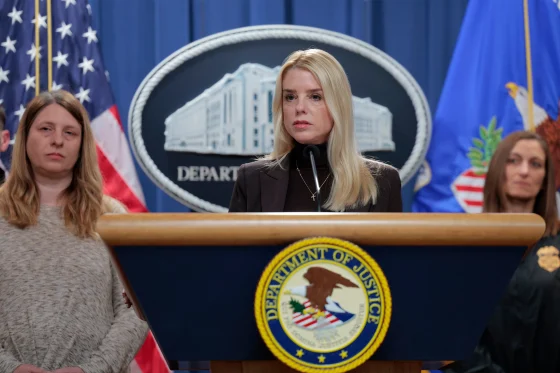
In a significant legal and political shift, the U.S. Department of Justice (DOJ) has dropped federal lawsuits against Texas, Iowa, and Oklahoma that challenged the states’ controversial immigration enforcement laws. The decision reflects a change in direction under the Trump administration, giving states more autonomy over immigration-related enforcement — a domain traditionally controlled by the federal government.
Background: A Clash Over Immigration Authority
The dropped lawsuits were initially filed by the Biden administration, which argued that state-level immigration laws violated the Supremacy Clause of the U.S. Constitution and interfered with federal immigration policy.
All three states passed laws that empowered local law enforcement agencies to arrest and detain individuals suspected of entering the United States illegally — actions the DOJ had previously said were the exclusive responsibility of federal immigration officers.
Texas and Senate Bill 4
The most high-profile case involved Texas Senate Bill 4 (SB 4), passed in 2023. This law allows state and local police officers to arrest individuals suspected of crossing the U.S.-Mexico border illegally. It also permits Texas judges to issue deportation orders — powers historically reserved for federal judges and immigration courts.
Under President Biden, the DOJ sued Texas, asserting that SB 4 was unconstitutional and could lead to racial profiling. The law was temporarily put on hold by a federal appeals court, although it briefly went into effect in early 2024.
On March 20, 2025, the DOJ officially moved to dismiss its lawsuit against Texas. This move was widely expected after the inauguration of President Donald Trump, who has emphasized strong state involvement in immigration control. The full text of Senate Bill 4 can be accessed on the Texas Legislature Online website.
Iowa and Oklahoma: Similar Laws, Same Outcome

Following Texas, Iowa and Oklahoma passed similar measures in 2023. These laws allow local authorities to arrest undocumented immigrants who have been previously deported or denied legal entry into the United States. The DOJ had previously sued both states, stating that the laws interfered with the federal government’s exclusive power to regulate immigration.
Like in Texas, the DOJ has now withdrawn these lawsuits, a move that was applauded by state officials. Oklahoma Attorney General Gentner Drummond described it as a “win for state sovereignty,” while Iowa Governor Kim Reynolds said the decision will allow Iowa “to protect its citizens in the absence of federal leadership.”
Details of these states’ immigration laws are publicly available on the Oklahoma State Legislature and Iowa Legislature websites.
Legal and Political Reactions
Legal experts have expressed concern that these decisions may weaken the federal government’s authority in immigration matters. “This sets a precedent where states can start enforcing their own versions of immigration law,” said David Leopold, an immigration attorney and former legal advisor to U.S. immigration officials.
Immigrant advocacy groups also voiced alarm. The Iowa Migrant Movement for Justice said it plans to continue legal challenges at the state level, regardless of DOJ involvement. “These laws do nothing but criminalize our communities and open the door for racial profiling and discrimination,” the group stated in a press release.
On the other side of the debate, supporters argue the new laws are necessary in light of what they call “federal inaction” on border security and undocumented immigration. Texas Governor Greg Abbott has repeatedly accused the federal government of failing to protect U.S. borders, prompting him to launch Operation Lone Star, a state-led border security initiative.
More information about federal immigration policies can be found at the official U.S. Citizenship and Immigration Services (USCIS) and U.S. Immigration and Customs Enforcement (ICE) websites.
What’s Next?

The dismissal of the DOJ lawsuits doesn’t automatically validate the state laws — legal challenges can still proceed through the courts. Civil rights organizations are already preparing new lawsuits, arguing that these laws create a hostile environment for immigrants and may violate constitutional protections.
Moreover, federal courts may still weigh in on whether state judges can lawfully issue deportation orders or whether local police have the authority to enforce federal immigration rules.
In the meantime, the DOJ’s decision marks a turning point in the national immigration debate. It signals a broader shift toward state-led immigration enforcement, a strategy that aligns closely with the Trump administration’s hardline approach to border security.
Whether the courts ultimately uphold these laws remains to be seen, but the decision to drop the lawsuits has already reshaped the legal and political landscape of U.S. immigration policy.



